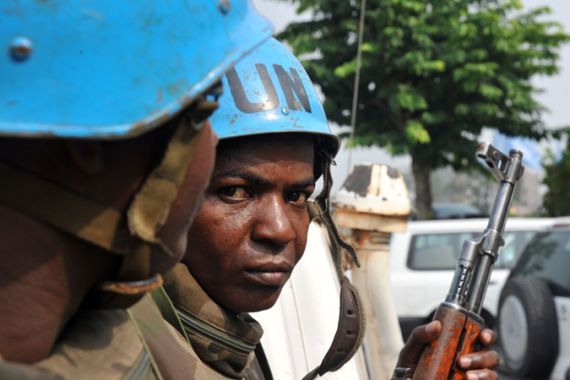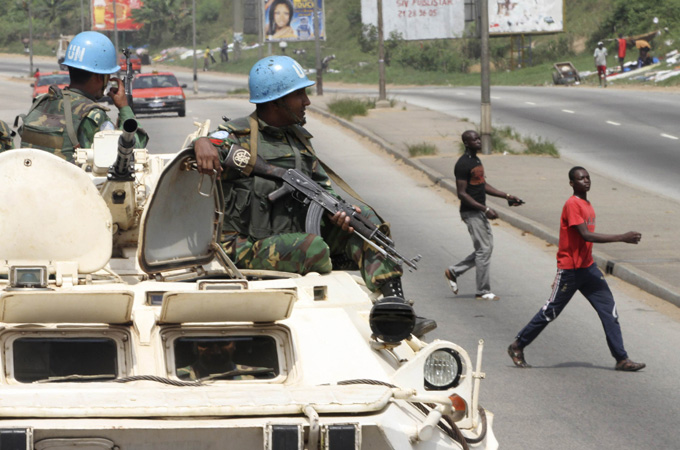UN to boost Cote d’Ivoire forces
UN Security Council beefs up peacekeeping mission with additional 2,000 troops as the latest mediation effort fails.

 |
| The UN will increase its peacekeeping force in Cote d’Ivoire to almost 12,000 [REUTERS] |
The United Nations Security Council unanimously agreed to deploy additional 2,000 peacekeepers to Cote d’Ivoire, where the incumbent president and his rival are still at a political impasse, with the former refusing to relinquish power in the face of mounting international pressure.
Wednesday’s vote, by the 15-member Security Council, will bolster the UN’s peacekeeping force to nearly 12,000 in the West African country; peacekeepers are to be deployed through June.
Cote d’Ivoire has seen violence and increased tension since the disputed presidential election in November, where Alassane Ouattara, widely seen as the legitimate winner, should have replaced Laurent Gbagbo as head of the nation.
Different tactics have been used to try and convince Gbagbo to leave, including multiple visits by African leaders, sanctions, and the threat of a military ouster.
Swiss authorities on Wednesday were also moving to immediately freeze any assets belonging to Gbagbo, Swiss President and Foreign Minister Micheline Calmy-Rey said.
But Gbagbo refuses to step down, retaining control of government buildings, state television and the security forces. He also holds a blockade around the Abidjan hotel where Ouattara is confined.
Openly hostile environment
UN Secretary-General Ban Ki-moon said the peacekeepers on the ground face an “openly
hostile security environment” with threats from forces loyal to Gbagbo.
The world body has reported more than 200 deaths in post-election violence in the African state.
Attacks against the peacekeepers have been mounting. Last week six of their cars were destroyed by pro-Gbagbo mobs, who accuse the UN of bias, and of being part of “a foreign plot” to remove their leader.
The draft resolution, which calls for increased troops in the region expresses “deep concern over the continued violence and human rights violations” triggered by the disputed presidential election.
This includes the attacks against UN peacekeepers and civilians; the resolution says those responsible for the crimes must be held accountable.
The Security Council extended the temporary deployment of 400 troops and 100 police officers from March 31 until June 30. It also authorised the transfer of armed helicopters from Liberia to Cote d’Ivoire for four weeks.
‘Amnesty window closes’
“Time is running out for an amicably negotiated settlement,” Raila Odinga, Kenyan president and AU mediator for the current crisis, said on Wednesday.
He was in Cote d’Ivoire for talks but left prematurely following yet another failed attempt to get Gbagbo to cease power.
“I regret to announce that the breakthrough that was needed did not materialise,” Odinga said in a statement issued Wednesday morning.
“The window of any opportunity for any amnesty will continue to close if Mr Gbagbo’s supporters continue to commit crimes against civilians and peacekeepers,” Odinga added.
Meanwhile, Gbagbo says he will no longer accept Odinga as mediator in his election row with Ouattara because he is biased, Gbagbo’s foreign minister said on Wednesday.
“Mr Odinga has failed in his mission and we are no longer prepared to receive him,” Gbagbo’s foreign minister Alcide Djedje told a news conference. “He was not willing to seek a durable solution…. He took the side of Mr. Ouattara.”
Military chiefs of West African regional bloc ECOWAS met in Mali on Tuesday to discuss the planning of a possible military intervention to oust Gbagbo.
ECOWAS hopes to consider all possible methods of engagement before resorting to the use of force.